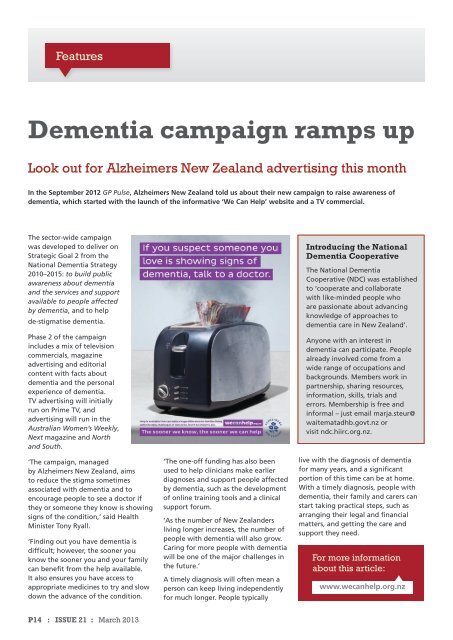GP Pulse March 2013 Issue 21 - The Royal New Zealand College of ...
GP Pulse March 2013 Issue 21 - The Royal New Zealand College of ...
GP Pulse March 2013 Issue 21 - The Royal New Zealand College of ...
You also want an ePaper? Increase the reach of your titles
YUMPU automatically turns print PDFs into web optimized ePapers that Google loves.
FeaturesDementia campaign ramps upLook out for Alzheimers <strong>New</strong> <strong>Zealand</strong> advertising this monthIn the September 2012 <strong>GP</strong> <strong>Pulse</strong>, Alzheimers <strong>New</strong> <strong>Zealand</strong> told us about their new campaign to raise awareness <strong>of</strong>dementia, which started with the launch <strong>of</strong> the informative ‘We Can Help’ website and a TV commercial.<strong>The</strong> sector-wide campaignwas developed to deliver onStrategic Goal 2 from theNational Dementia Strategy2010–2015: to build publicawareness about dementiaand the services and supportavailable to people affectedby dementia, and to helpde-stigmatise dementia.Phase 2 <strong>of</strong> the campaignincludes a mix <strong>of</strong> televisioncommercials, magazineadvertising and editorialcontent with facts aboutdementia and the personalexperience <strong>of</strong> dementia.TV advertising will initiallyrun on Prime TV, andadvertising will run in theAustralian Women’s Weekly,Next magazine and Northand South.‘<strong>The</strong> campaign, managedby Alzheimers <strong>New</strong> <strong>Zealand</strong>, aimsto reduce the stigma sometimesassociated with dementia and toencourage people to see a doctor ifthey or someone they know is showingsigns <strong>of</strong> the condition,’ said HealthMinister Tony Ryall.‘Finding out you have dementia isdifficult; however, the sooner youknow the sooner you and your familycan benefit from the help available.It also ensures you have access toappropriate medicines to try and slowdown the advance <strong>of</strong> the condition.‘<strong>The</strong> one-<strong>of</strong>f funding has also beenused to help clinicians make earlierdiagnoses and support people affectedby dementia, such as the development<strong>of</strong> online training tools and a clinicalsupport forum.‘As the number <strong>of</strong> <strong>New</strong> <strong>Zealand</strong>ersliving longer increases, the number <strong>of</strong>people with dementia will also grow.Caring for more people with dementiawill be one <strong>of</strong> the major challenges inthe future.’A timely diagnosis will <strong>of</strong>ten mean aperson can keep living independentlyfor much longer. People typicallyIntroducing the NationalDementia Cooperative<strong>The</strong> National DementiaCooperative (NDC) was establishedto ‘cooperate and collaboratewith like-minded people whoare passionate about advancingknowledge <strong>of</strong> approaches todementia care in <strong>New</strong> <strong>Zealand</strong>’.Anyone with an interest indementia can participate. Peoplealready involved come from awide range <strong>of</strong> occupations andbackgrounds. Members work inpartnership, sharing resources,information, skills, trials anderrors. Membership is free andinformal – just email marja.steur@waitematadhb.govt.nz orvisit ndc.hiirc.org.nz.live with the diagnosis <strong>of</strong> dementiafor many years, and a significantportion <strong>of</strong> this time can be at home.With a timely diagnosis, people withdementia, their family and carers canstart taking practical steps, such asarranging their legal and financialmatters, and getting the care andsupport they need.For more informationabout this article:www.wecanhelp.org.nzP14 : ISSUE <strong>21</strong> : <strong>March</strong> <strong>2013</strong>
















